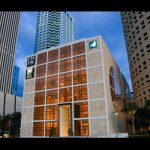Florida Museum of Photographic Arts
Date
Location
FMoPA also offers a variety of classes taught by highly validated professionals, exploring the technical aspects of photography, the creative potential residing in everyone, and the applications towards creative practice. All the workshops can be taken as single units of particular interest, or as a full concentration resulting in certificates of completion.
We look forward to a most productive and fruitful year with over 30 workshops that cover most aspects of photography and promote photography education. FMoPA also provides guided docent tours.
The Florida Museum of Photographic Arts is a museum dedicated to exhibiting important photographic art as central to contemporary life and culture. FMoPA collects, preserves, and exhibits historic and contemporary works by nationally and internationally known photographic artists. FMoPA also enriches the community by operating outreach programs to educate children and adults.
In the fall of 2001, Cynthia L. Flowers began the museum’s first children’s outreach program. It involved under-served children at the USF/Patel Partnership Elementary School located at the University of South Florida in Tampa.
From this first program, the museum developed many ongoing community programs such as the free Children’s Literacy Through Photography Program for at-risk children, and fee-based adult photography classes, workshops, and children’s summer camps. In the Children’s Literacy Through Photography Program, children are inspired through hands-on workshops and field trips where photographs are taken, printed and written about by the participants. An annual reception for the children was also held at the museum.
FLORIDA MUSEUM OF PHOTOGRAPHIC ARTS FIELD TRIPS
The Florida Museum of Photographic Arts has a collection that draws intrigue for all ages, but it can be overwhelming without a helpful guide to go in-depth on our exhibitions. That’s why the Docent-led tours are such an amazing opportunity for students to broaden horizons and learn about photography. With the help of our extremely knowledgeable and engaging docents, the students will find themselves entranced by the history and beauty of photography from the past, present, and future. Docents will guide students through a structured tour of the museum to educate them on the art, and specific artists on display, as well as more broadly about photography. Additionally, the museum is set in the Cube in the heart of downtown Tampa and the impressive architecture will leave both students and teachers in awe.
Our instructors also have the ability to alter each tour for students depending on their age and education level and have experience in teaching our classes to under-privileged children through our outreach programs. We would love the opportunity to work with any grade level!
Additionally, there is an event space on the third floor of the museum so that classes will be able to have group discussions about what they have learned. There is also the expansive Curtis Hixon Park right outside of our building. So, if it is desired, students may enjoy the gardens and eat lunch outside or in the cafe on the first floor of the Cube.
FMoPA has a program called Prodigy, which will effectively make a difference with children that would not otherwise have access to art programs, or museums. It is increasingly clear that changing lives is at the root of any art’s social responsibilities. Through this partnership and the medium of photography, we will provide children who are socioeconomically challenged, culturally displaced or recovering from the trauma of a refugee situation with an artistic outlet.
Prodigy program will provide children with a solid foundation of photographic education, providing guidance and knowledge of the technical aspects of photography, as well as the artistic applications. The program benefits more than just photographic skills; teamwork, problem-solving, and critical thinking will be applicable in all of the activities that children will participate in. Students attending the program are given the opportunity to be innovative by allowing them to create a narrative using photographs on many varied topics from current global environmental issues to local socio-economic challenges. These skills and applications will ultimately be applied to a brighter future.


Leave a Reply